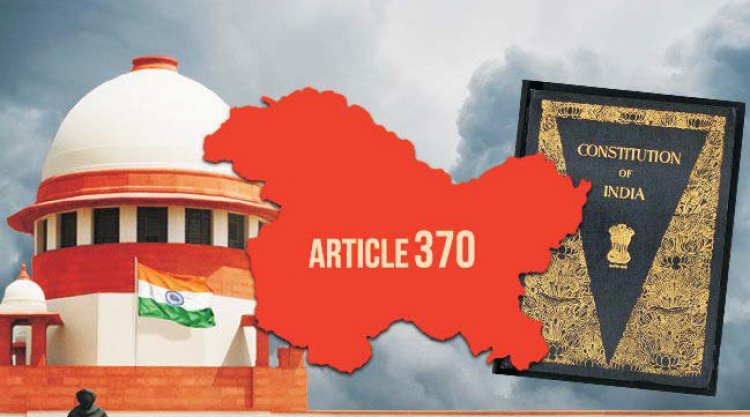Kashmir: Long Road to Normalcy
Amulya Ganguli

The second anniversary of the abrogation of Article 370 of the constitution relating to the special status of Jammu and Kashmir has been observed in circumstances markedly different from what they were two years ago.
The troops and paramilitary forces on the streets in Srinagar and other towns are no longer around while most of the jailed leaders and activists have been released. The Internet, too, is up and running. Even then, despite the government’s claim that a new age is dawning in the Union territory, few will say that the situation is normal.
True, the earlier signs of insurgency such as attacks on the security forces by stone-pelters and praise for the “martyred” heroes of the uprising have ended. Even the separatist Hurriyat leaders who constituted a group which was nearly as important as the mainstream politicians have fallen silent.
However, the occasional acts of violence by Pakistan-based terrorists are an indication that all is not well and that Kashmir remains a focal point of the jehadis, both external and internal. The possibility that their acts of depredations will increase if and when the Taliban establish their hegemony in Afghanistan is a new worry for the region.
However, the current relative quiet doesn’t mean that the people in general have happily accepted the loss of Kashmir’s special status. Instead, a sense of resignation appears to be the prevailing mood. It will not be until the assembly elections are held and produce a palpably fair result that the genuine sentiments of the locals will be known. Till then, whatever the government and its critics say will be regarded as no more than propaganda.
A step in the direction of the polls was taken when prime minister Narendra Modi and other senior government leaders met the recently released former chief ministers – Farooq and Omar Abdullah and Mehbooba Mufti – as well as other members of the so-called Gupkar alliance who now claims to be the sole representative of the mainstream of Kashmiri opinion.
Although promises were made about the restoration of statehood, the focus in the coming days will be mostly on the completion of the delimitation process which will pave the way for the elections. The Gupkar alliance is wary of the process since it suspects that the government is tweaking the constituencies in a way which will whittle down the Kashmir valley’s Muslim-majority status. The divide between the valley and the Hindu-majority region of Jammu is well known while the Buddhist-majority Ladakh has been hived off to constitute a separate Union territory.
Since it is possible that the elections will not be held this year, Kashmiris will have to prepare for a longish period of being in some kind of a limbo where the removal of the earlier restrictions hasn’t restored full democracy although local elections have been held.
The centre, on its part, will undoubtedly be relieved that the release of the National Conference and People’s Democratic Party (PDP) leaders has enabled it to assert that civil liberties are no longer curtailed. As a result, the international pressure which it faced on the issue is now much less.
Considering, however, that there is overall concern about the current democracy “deficit” in India even among those who were earlier admirers of the country in the Western media, there is little doubt that along with the farmers’ agitation and the Pegasus spyware’s intrusion into private lives, Kashmir will never quite go off the radar where human rights are concerned. Any hint that the elections are being unnecessarily delayed because of the fear that the National Conference, the PDP and other anti-abrogation parties are gaining ground will be damaging for the centre’s and the election commission’s reputation.
Next year’s state assembly elections elsewhere in India will also be crucial in setting the template for the political mood in the country. If the BJP stumbles in U.P., Goa, Gujarat and other states in the sense of failing to score comfortable victories as in the previous round, then some of the parties may rethink their positions on Article 370. Already, the Congress is far more vocal in its opposition to the scrapping of Kashmir’s special status than before. The other opposition parties may join it as the momentum for forming an anti-BJP alliance increases.
Richly endowed with natural beauty which made the Mughal emperors choose Kashmir as their favourite holiday destination, thereby substantiating the saying that “if there is paradise on earth, it is here, it is here, it is here”, Kashmir had also been the location for blockbuster Bollywood films till the growing disturbances ruled out such ventures. The manner in which the Kashmiri pandits had to flee because of the rising terrorist activity, leaving their ancestral homes in the valley, made Kashmir lose its reputation of being paradise.
Pakistan’s contention that the “K” in its name stands for Kashmir has made it try relentlessly to acquire the former state by hook or by crook with terrorism as its primary weapon. Sections of the locals were also influenced by Pakistani propaganda to take up arms against the Indian state while attempts by New Delhi and Islamabad to resolve the “dispute” by making the Line of Control “irrelevant”, as Indian Prime Minister Manmohan Singh and Pakistani President Musharraf once presumed, led nowhere.
The deletion of Article 370 is the latest initiative to bring Kashmir closer to India, as the BJP and other supporters of the move say while their opponents believe that it has pushed the Union territory, particularly the Muslim-majority areas, further away. The truth will not be known till the assembly polls are held.
















